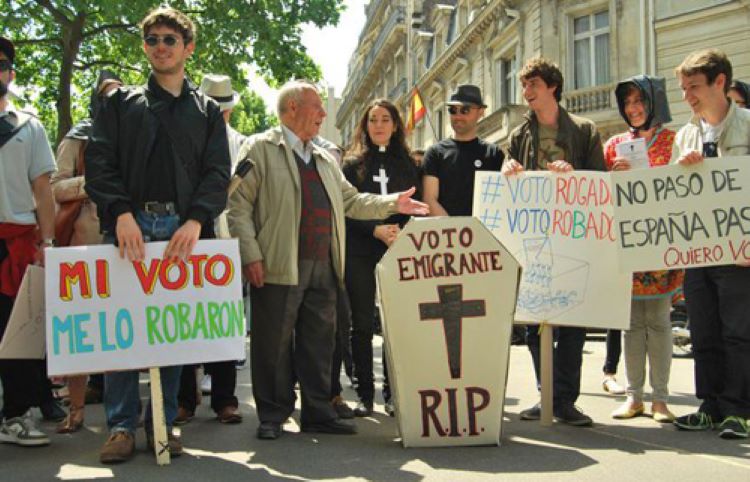The Diplomat
Today officially enters into force the law reforming the Organic Law of the General Electoral Regime (LOREG) to facilitate the vote of Spaniards living abroad, which puts an end to a system, the rogatory vote, whose application since January 2011 had resulted in a sharp decline in the participation of those registered in the Census of Absent Residents (CERA).
As published yesterday in the Official Gazette of the State (BOE), the system of the “rogatory vote” obliged Spaniards residing abroad to previously request or beg to vote in order to participate in the general, regional or European Parliament elections, complying with a series of very short deadlines both for the request of the electoral documentation and for the remission of the vote by postal mail or its deposit in the ballot box.
Such circumstances, together with the time required to collect and print the documentation to be sent, and the dependence on foreign postal services, made it difficult to comply with the deadlines established in the electoral regulations, and with it the exercise of this fundamental right for a very large number of people, largely because they did not receive the electoral documentation on time or because there were incidents in the subsequent sending of their votes by postal mail to the Consular Offices.
For that reason, in the 2011, 2015, 2016 and April 2019 general elections, less than 10 percent of voters requested or begged to vote as a result of the complexity of the procedure (with the exception of the November 2019 elections, in which voters who had requested the documentation in the April elections – 8.69 percent – did not need to reiterate their request, which, together with new requests, made it possible to reach a percentage of 10.61 percent). Apart from that, turnout levels were even lower, ranging from 4.73 to 6.8 percent in the 2011, 2015, 2016 and 2019 general elections, percentages that contrast sharply with the average turnout data prior to the approval of the 2011 reform, which ranged from 22.99 percent in 2000 to 31.88 percent in 2008.
In this context, the reform of the Organic Law intends to “respond to the demands of the Spanish community abroad and abolish the requirement that Spaniards living abroad have to request or beg for the vote, which will allow everyone to receive the documentation ex officio at home,” added the Government, through the BOE. Likewise, the optional use of a ballot paper that can be downloaded telematically will make it possible to bring forward the deadlines for sending the electoral documentation. “All this will make it easier for voters to receive the documentation on time, unlike what has been happening until now in many cases, as it will be possible to send the documentation before the proclamation of the candidacies and the resolution of the challenges,” it added.
This reform is also completed with an extension from three to seven days of the deadlines for the deposit of the vote in the ballot box and maintains the possibility of sending the vote by mail to the corresponding Consular Office in case the voter cannot go to vote in the unit enabled for that purpose. In addition, the term for the opening of the votes cast from abroad is extended from three to five days, delaying in the same interval the term of the general scrutiny. Finally, the system for the identification of voters in the case of absentee voting is reinforced as a guarantee measure.
“Already published in the BOE the law that suppresses the rogatory vote”, declared the Minister of the Presidency, Félix Bolaños, through his Twitter account. “From now on, Spaniards living abroad will receive the electoral documentation without having to request it and will have enough time to exercise their right to vote,” he added.
With this measure, declared the Minister of Foreign Affairs, José Manuel Albares, through the same social network, “the exercise of the right to vote is facilitated for Spaniards residing abroad”. The Foreign Action Strategy 2021-2024, approved at the end of January 2021, pledged to promote “the necessary reform of the electoral law to simplify the requirements for participation in all electoral processes for Spaniards abroad”.
The modification of the LOREG was approved by the Congress and the Senate last June 9 and September 21 based on a bill presented, in February 2021, by the Socialist Group and the Confederal Parliamentary Group of Unidas Podemos-En Comú Podem-Galicia en Común. The rogatory vote was introduced in 2011 by the Government of the Socialist José Luis Rodríguez Zapatero with the support of PSOE, PP, CiU and PNV.







